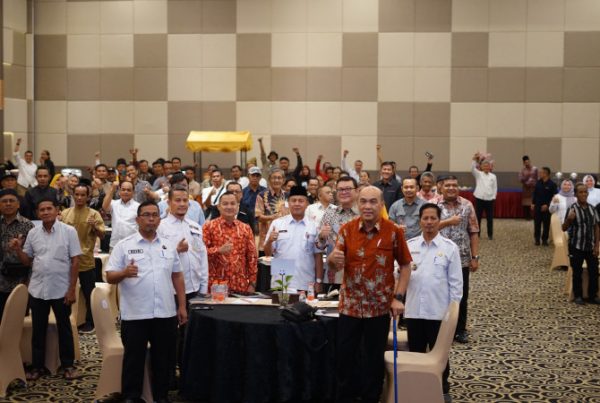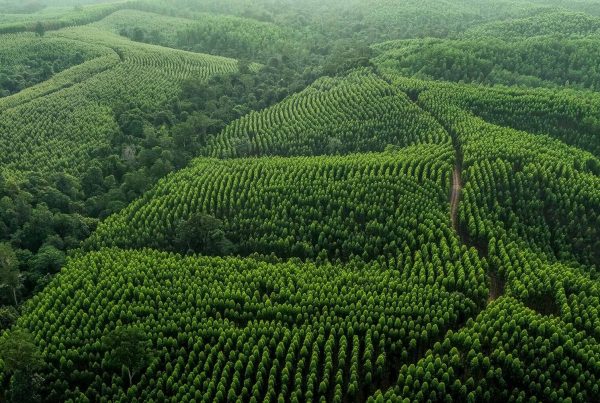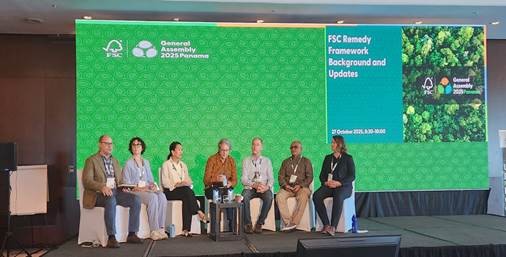From initial distrust to growing openness, the process so far shows how small changes can build a foundation for credible and lasting remedy.
Introducing the FSC Remedy Framework to local communities is not a straightforward process. In many parts of Riau province, in Sumatra, communities continue to carry the impacts of past land conflicts and unresolved grievances.
This lingering distrust was the first challenge faced by the Forum Komunikasi Kehutanan Masyarakat (FKKM) or Community Forestry Communication Forum, in Riau when the community readiness program was launched with APRIL in 2024 in Riau province, Sumatra, Indonesia.
The FKKM is a non-profit, independent, and non-partisan multi-stakeholder organization established to promote equitable and sustainable forest resource management through the development of community forestry or social forestry in Indonesia. FKKM plays a strategic role as a platform for dialogue, capacity building and conflict mediation, as well as in developing and implementing community forestry and social forestry practices on the ground.
“At the beginning, there was distrust from the community about what we were trying to explain to them. They were skeptical because these issues had been happening for decades and were never resolved,” says Harry Oktavian, Chair of the Regional Executive Board, FKKM Riau.
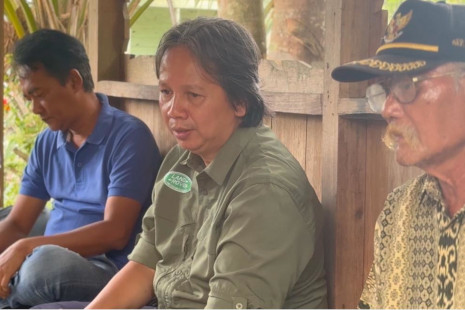
Harry Oktavian, Chair of the Regional Executive Board, FKKM Riau
FKKM’s preparation and mentoring program happened in five areas in Riau province: Penyengat indigenous village (in the Siak regency), Bagan Melibur (Kepulauan Meranti), Mekar Delima (Kepulauan Meranti), Teluk Binjai (Pelalawan), and Batu Panjang (Bengkalis). The total area covered by these communities, which have a combined population of 12,228, is approximately 256,000 hectares.
“From the outset, the initiative was designed not only as preparation for remedy but also as a bridge to facilitate the future involvement of communities in the certification processes. Through consistent facilitation and education, we have seen attitudes gradually begin to shift”
“Communities that were once closed and doubtful are now more open, with some asking when the remedy process will officially begin. We recognized that awareness is the foundation of readiness. Without it, communities are not properly prepared to negotiate in remedy planning. Readiness needs to go beyond rebuilding trust,” says Oktavian.
The program has two core objectives. First, to identify social cases that fall under FSC’s definition of unacceptable activities or harms, while mapping affected stakeholders and rights holders. Second, to provide training and mentoring so that communities have the capacity to engage equally in remedy implementation.
“Before entering the field, our facilitators received coaching on FSC regulations, facilitation methods, and their roles in supporting communities. In practice, FKKM facilitators are embedded in daily life across the five target villages. They not only attend formal meetings but also fish with local fishermen, work alongside farmers, and join community activities. These ‘live-in’ stays, which range from three days to one week, allow our facilitators to build stronger personal bonds and trust with the community”.
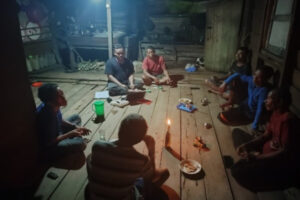
Mekar Delima Village community dialogue as part of the community readiness program
Beyond these interactions, FKKM has also organized focus group discussions, in-depth interviews, and dialogues with village leaders and traditional authorities. Facilitators introduced the concept of Free, Prior and Informed Consent (FPIC), trained negotiation skills, and helped communities to independently identify and map the impacts they experienced.
This process includes both individual impacts (such as smallholder rubber or sago plots) and collective impacts (such as fishermen and hunters who lost access to protein sources when forests were converted to industrial plantations). Given the sensitivity of these issues, the process is repeated over time to ensure communities feel comfortable sharing their stories.
Why It Matters
Community readiness is critical because remedy cannot simply exist on paper. Communities need to understand the process, know their rights, and have the capacity to participate equally in negotiations.
For APRIL, community involvement is also the foundation for rebuilding trust. This trust is built not only on commitments from APRIL top management but also on consistent behavior and interactions by the field teams in the local communities’ everyday life.
“As part of the process, we have to ensure we listen to a wide range of views. It is not enough to only listen to formal leaders, but we must also include women, youth, fishermen, farmers, and indigenous groups to get overall perspectives,” says Oktavian.
By August 2025, the program had shown real results. In Penyengat, facilitators are fully supported by the community. In Bagan Melibur, villagers are eager for remedy to begin. In Mekar Delima, communities have documented the impacts of annual flooding on dozens of families. In Teluk Binjai, village officials are actively expanding facilitation efforts.
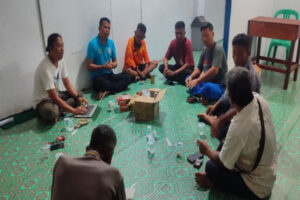
Penyengat Village community dialogue as part of the community readiness program
However, readiness alone is not sufficient. In Bagan Melibur, for example, the village established a verification team to review land claims before negotiations with the company. True readiness means ensuring that communities have negotiation capacity and, when needed, access to advisors or legal support so that they can participate on equal terms with the other parties.
These efforts are already starting to build awareness of FSC and foster an understanding of rights that can be collectively exercised.
While these developments are encouraging, FKKM recognizes that readiness remains a work in progress. Distrust rooted in past experiences will take a long time heal. Some community members still require repeated explanations about the FSC remedy framework. Ensuring inclusivity is also essential so that the voices of vulnerable groups are fully represented.
If the independent assessors are only able to spend two to three hours in a village, this could create additional risks of important cases not being fully documented. FKKM’s role in preparing and capturing these inputs is therefore vital to a credible remedy process.
“Awareness is growing, and communities are increasingly ready, but remedy is a long journey. They need continued support to truly participate on equal terms”.
According to Harry, the next step is to connect community readiness with the formal remedy process. Data collected from impact identification must be verified and used as the basis for dialogue with the company. Additional capacity building is needed, including deeper understanding of FSC’s remedy mechanisms, so that communities can not only attend negotiations but also shape their outcomes.
Transparency by all parties is also critical
FKKM’s focus right now is on sustained facilitation. This program is not only about documenting the past, but also about building a stronger foundation for community participation in remedy going forward.

